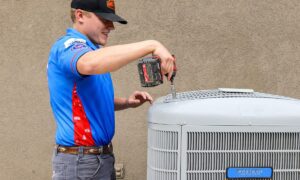Summertime is here, and so is the heat! With temperatures soaring high, it’s time to crank up that AC. But have you ever wondered how long your trusty cooling machine will last? Well, fear not because we are here to answer all your questions about the minimum life of an AC. Whether you’re a homeowner or business owner, keeping your AC in tip-top shape is essential for staying comfortable during hot summer days. So sit back, relax, and read on to find out everything you need to know about your beloved air conditioning unit’s lifespan. Click here for best air conditioners for sliding windows.
How long do different types of ACs last?
When it comes to the lifespan of an AC, much of it depends on the type and quality. The most common types of ACs are central air conditioning units, ductless mini-split systems, window units, and portable air conditioners.
Central air conditioning units typically last between 15-20 years with proper maintenance. However, if you neglect regular maintenance or have an older unit that’s been through a lot of wear and tear, its lifespan may be shorter.
Ductless mini-split systems can last up to 25 years when maintained properly. These systems are known for their energy efficiency and durability but require professional installation and occasional cleaning.
Window units usually last around 10-15 years with good care. Keep in mind that these units tend to work harder than other types since they’re designed to cool only one room at a time.
Portable air conditioners can last up to 10 years on average but often have a shorter lifespan due to their smaller size and less durable components.
It’s important to remember that the longevity of your AC is affected by many factors such as usage frequency, maintenance routine, environment conditions among others.
How to know when your AC needs to be replaced
It’s not always easy to know when your AC needs to be replaced. However, there are a few signs that can indicate it’s time for an upgrade.
If your AC is over 10 years old and constantly requires repairs, it may be approaching the end of its lifespan. Additionally, if you notice that your energy bills are steadily increasing despite no changes in usage patterns, it could be a sign that your AC is working inefficiently and needs replacing.
Another telltale sign that your AC needs replacing is if it struggles to maintain a consistent temperature throughout your home. Uneven cooling or heating can signal issues with the system’s compressor or ductwork.
Strange noises or unpleasant odors coming from your unit could also be indicators of bigger problems within the system. If these issues persist after professional maintenance services have been performed, then replacement may be necessary.
Remember: proper maintenance and timely replacements are key in ensuring optimal performance and longevity of any HVAC system!
Tips for prolonging the life of your AC
To prolong the life of your AC, there are several things you can do. Make sure that the air filter is cleaned or replaced regularly as this will help keep your unit running efficiently. Dirty filters restrict airflow which puts a strain on the system and causes it to work harder.
Another tip is to have your AC serviced by a professional annually. This will ensure that any potential problems are caught early before they turn into bigger issues down the line.
You should also be mindful of how you use your AC. Try not to set the temperature too low as this will cause unnecessary wear and tear on the unit. Use ceiling fans or open windows when possible instead.
In addition, avoid placing objects near or on top of your AC unit as this can obstruct airflow and make it less efficient.
Consider investing in a programmable thermostat so you can regulate temperatures more effectively without putting too much pressure on your system.
By implementing these tips, you’ll not only extend the life of your AC but also save money in energy bills over time.
How to properly maintain your AC
Proper maintenance of your AC is crucial if you want it to last for a long time. Here are some tips on how to maintain your AC properly:
Make sure that you clean or replace the air filter regularly. A dirty or clogged air filter can cause your AC to work harder than it needs to, leading to increased energy consumption and reduced lifespan.
Keep the outdoor unit free from dirt and debris by cleaning it periodically with a soft-bristled brush or hose. This will prevent any obstruction in its airflow which may lead to overheating or system failure.
Check for leaks in the refrigerant lines as low levels of refrigerant could indicate there’s a leak somewhere in the system that needs repair.
Fourthly, schedule professional maintenance checks at least once every year so that any underlying issues can be identified early before they escalate into expensive repairs.
Ensure that all electrical connections are tight and secure since loose connections can result in serious damage such as short-circuits and fire hazards. By following these simple steps, you’ll be able to enjoy cool comfort from your AC all year round while extending its lifespan significantly!
Conclusion
After considering all the factors, it is clear that the minimum life of an AC depends on various aspects. However, with proper maintenance and care, you can extend your unit’s lifespan by a significant amount.
Regular cleaning and replacing air filters are two easy steps that homeowners can take to ensure their ACs continue to function optimally. Additionally, scheduling professional inspections every year will help identify any issues early enough before they escalate into more complex problems.
In conclusion (oops!), there is no definitive answer to how long an AC lasts. The lifespan varies depending on factors such as usage patterns, climate conditions, and maintenance practices. Nonetheless, following the tips shared in this article should give you a good chance at extending your unit’s longevity while enjoying optimal performance for years to come.



































